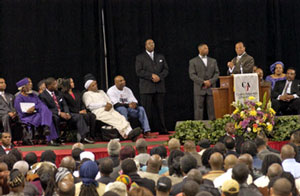- Reparations Summit – NDABA IV comes to Baltimore (FCN, 11-13-2005)
- The Movement for Reparations (FCN, 08-16-2002)

ATLANTA (FinalCall.com) – The Reparations Movement, spearheaded by Dr. Conrad Worrill, chairman of the National Black United Front, and the National Coalition of Blacks for Reparations in America (N’COBRA), came to this city March 19 with NDABA V, a South African word meaning “a great sitting down.”
“The consistency and commitment of key organizations, activists, researchers and organizational representatives in the Reparations Movement through the ndaba process demonstrated over the weekend the continual level of operational unity that is needed and required for Black people to win reparations in our lifetime,” explained Dr. Worrill to The Final Call.
“This was a tremendous success and was highlighted by five student organizations at the Atlanta University complex that cosponsored the mass meeting and made it possible for Minister Farrakhan to speak Saturday night before 3,000 people at Clark Atlanta. The Reparations Movement is gaining momentum. We are working on NDABA VI.”
This meeting was a coming together of local and national organizations to assess where the movement was and where they were headed. The Honorable Minister Louis Farrakhan gave the keynote address at the opening plenary session.
“We already know the government owes us,” he told the standing-room only audience at Clark Atlanta University. “We already know we can demand. We already know White supremacy won’t give us anything until we come as a united front.”
“When we are in unity, we don’t have to demand–we can command. As long as we don’t speak with one voice, these demands will go on from generation to generation, and 100 years from now we’ll still be talking about this.”
He added, “We don’t have that kind of time. We have a chance in this moment to do something so great.”
His words were received with a thunderous applause. The Minister explained that “unity” is the one thing that we had not tried.
“God is never concerned with individuals,” he explained. “We must determine that, in our time period, we can’t leave our people in this condition. I’m not concerned about reparations. I’m concerned about our unity. Reparations will come the quicker we are in unity.”
“You don’t have to worry about White supremacy. That’s going to be there until we unite. When we unite, it will crumble like the walls of Jericho.”
The opening session also featured Attorney Deadria Farmer Paellman, who has distinguished her work in the Reparations Movement by targeting the major corporations that profited from slavery that few, if anyone, knows have benefited from it.
“In 2000, Aetna Insurance Company was the first corporation I identified as having slave policies,” Attorney Paellman said. That work lead to an apology from the company in 2002.
“The work I do is spiritually directed. I went to law school especially for this purpose (reparations). Every class I took was to support my case for reparations. I am really pleased to be here and see NDABA happening. I thank Minister Farrakhan for his leadership. This couldn’t happen without him,” she told the audience.
The afternoon included working groups to advance the Reparations Movement on organizational collaboration, legislation, litigation, research and scholarship, criminal justice, youth and students, education, internal healing and the Black spiritual faith community. It was also proposed that a new working group be added on international reparations.
The highlight of the conference was the mass meeting held that evening at Clark Atlanta University.
Darius Jones, from the office of University Relations, welcomed Minister Farrakhan to the campus on behalf of President Walter Broadnax.
“It is a high honor to welcome Minister Farrakhan and Dr. Conrad Worrill to Clark Atlanta. We have a steady stream of young people preparing themselves to carry the torch,” he said. “We commend the president and the administration for their courage in allowing the NDABA to come to this campus.”
He was referring to the fact that this was the first time Minister Farrakhan had been allowed to speak on a Black college campus in nearly 20 years. The students honored him that night with a special plaque.
Introduced by Malik Zulu Shabazz, chairman of the New Black Panther Party, Minister Farrakhan told the crowd of students and community members that a moral awakening is needed among Black people.
“We must show the world a new people coming up. Time for foolishness is over,” he insisted to a thunderous applause. “This is the year for us to break down all walls. This is our time.”












